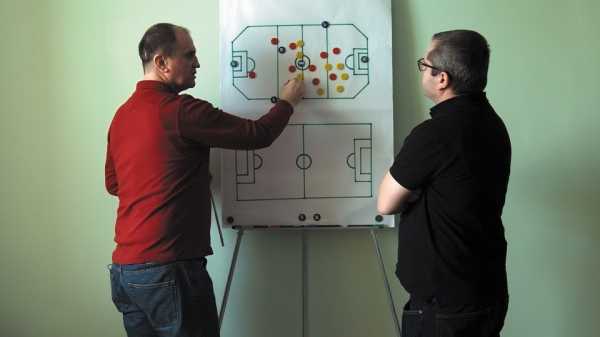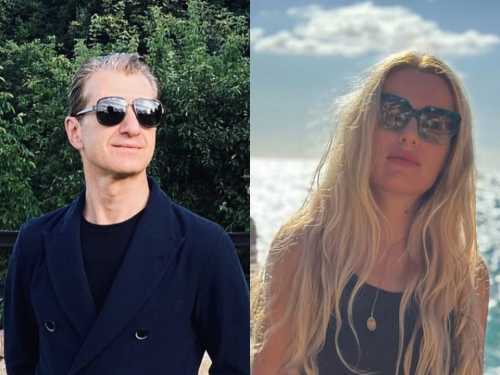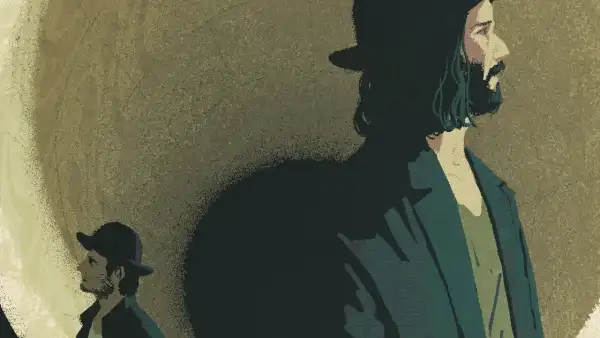
Many of the best films that rumble into town with theatrical releases have previously tiptoed in, in the form of isolated film-festival screenings. So it is with two major movies on screens now (“Zama” and “Jeannette”) as well as this Friday’s two major openings (“Let the Sunshine In” and “Mrs. Hyde”). I wrote about all of these films at the time of their festival premières (three of the four were at the New York Film Festival), because eventual theatrical release is never assured for festival selections, and a chance to see them should never be squandered. So it is with a documentary, the Romanian director Corneliu Porumboiu’s “Infinite Football,” that’s among the best I’ve seen in quite a while. It has no distribution set but is playing in the Art of the Real series that runs at Film Society of Lincoln Center from April 26th through May 6th.
Art of the Real, in the vein of the groundbreaking True/False Film Fest (in Columbia, Missouri), is devoted to expanded, reimagined, audacious varieties of nonfiction filmmaking. Superficially, it’s hard to see the expansiveness of “Infinite Football” (screening only once, on May 5th—the film’s North American première).For almost its entire seventy-minute span, though, “Infinite Football” is just a series of interviews that Porumboiu conducts with a middle-aged man in Vaslui, the filmmaker’s home town. Porumboiu, who is better known as a director of fictional films (albeit ones that integrate history and nonfiction, as in his first feature, “12:08 East of Bucharest,” from 2006, which I discussed here recently), brings the same conceptual and compositional power, the same audacity and originality, to his documentary filmmaking. “Infinite Football” has no added music or visual effects, no voice-over commentaries, no archival footage; almost the entire movie is—not quite talking heads, but talking bodies. Yet it’s one of the most original and visionary documentary films to have emerged recently, a worthy cinematic companion for such films as “Did You Wonder Who Fired the Gun?” and “Rat Film” in its extraction of vast ideas from the perspective of local, small-scale, first-hand experience of a single subject, which is, in fact, soccer.
The concept is simple: an acquaintance from Vaslui, a minor functionary named Laurentiu Ginghina, has some ideas for changing the rules of soccer. Severely injured in 1986 in an on-field pileup while still a teen-ager, Ginghina wants to keep the action of the game spread out—and he imagines dividing each team into two sub-teams, offense and defense, of five players each (beside the goalie), each of which would be barred from crossing the centerline. His idea is twofold: to prevent swarms of players, and to keep the ball moving quickly. Ginghina theorizes that, by making the players move less, the ball will have to move more, resulting in what he considers a more exciting game—because, he adds, the star of a soccer game is the ball, without which the supposed star players are only “the star of a shampoo commercial.” Ginghina explains that these changes would be only the start (he also imagines adding more boundary lines and further subdividing the teams), and that he’s proposing Football 2.0 but anticipating Football 2.1, 2.9, 3.0, 4.0—to which Porumboiu jokily adds, “Infinite football.”
What’s significant about Ginghina’s ideas, however, goes far beyond soccer. His plans for the game seem at first like the quixotic visions of an impish local crank, one whose intense, if jovial, sincerity is matched by the mighty impracticality of his obsessive quest. But Porumboiu (who reveals, late in the film, his lifelong acquaintance with Ginghina) doesn’t present his subject as a crank, and certainly not as a fool (although he openly expresses his skepticism regarding his friend’s plans for soccer). Rather, the filmmaker unfolds Ginghina’s experiences inductively, stepwise (a crucial marker of the film’s originality is in the imposing contrast between the simple, concentrated practicality of the film’s substance and the resonant grandeur of its moment-by-moment revelations). Porumboiu cinematically constructs—both through the patient, subtly but decisively shaped interviews and the cannily gradual editing—a life story that engages, at crucial points of contact, with the political history of his times and that reflects aspirations and inspirations that are themselves of a historic power.
The first political echoes come from dates—the origins of Ginghina’s ideas date to the last years of Communism in Romania, before what Porumboiu calls the revolution of 1989. The director films Ginghina at the handball court that had served as a soccer field and where his initial injury occurred, and then shows him at the now-abandoned industrial site where, during a hard workday, the injury was compounded. (Ginghina reënacts, with an actorly aplomb, his former miseries while unspooling reminiscences of the Communist-era practices from which they were inseparable.) Forced to abandon his dreams of becoming a forest ranger, Ginghina scaled back his aspirations; moderately educated (he got a degree in sociology) and modestly employed as a clerk and administrator in the local government, frustrated in his efforts to move to the United States (the September 11th attacks play a role in the story), recalibrating his focus toward the European Union and a new way of life in Romania, he ultimately finds an outlet for his formidable energies in his reconception of the game of soccer.
There are spectacular superhero films (including the latest, “Avengers: Infinity War”) where the warning against spoilers is mere vanity—little that happens there actually proves to be much of a mental or emotional shock. By contrast, the remarks made by Ginghina in the course of “Infinite Football,” though they’re in no way intimate personal revelations or public scandals, nonetheless deliver such astounding leaps and associations of ideas and gems of expression that it would be unjust to deliver them in advance on the page. (For that matter, those superhero films themselves play a strange and wondrous role in Ginghina’s sense of identity and ambition.)
Many such giddily wondrous moments emerge in the course of Ginghina’s onscreen discussions, including his admission that the idea for dividing the soccer field came from his observation of an electric fence dividing herds of cattle in a Nevada ranch, and also his explanation of just how close his rule-change came to being enacted as a result of meetings in London with British sports lawyers. Even the apparently routine paperwork and meetings of his bureaucratic job reach to the marrow of history, as in cases involving the restitution of property taken by the state in the Communist era (a series of procedures that are still, decades later, ongoing).
But what gives his talk and his quest its enduring importance is the force of the ideas that motivate him. Ginghina, living in obscurity in a provincial town, is a sort of humanistic genius whose underlying yearnings for a better world find their most concrete and specific form in his plans for soccer—and he’s well aware of the large-scale societal implications of his project. He begins his quest with the desire to challenge and revise “rules” and “norms”; he envisions a sport that would emphasize “fluidity, mobility,” and that’s exactly what he imagines for life at large. The movie rises to a quietly majestic concluding sequence—the only one with any particular visual effect—in which Ginghina returns to the source of his idea, the series of devastating injuries that he suffered in the mid-eighties, and what he imagined to be its religious and moral implications. In the process, he returns to yet another set of rules and norms, ones arising from the Bible. It would be unfair to give away the vertiginous heights of his insights and aspirations; suffice it to say that the movie ends with his spectacularly resonant and inspiring vision, one of a world that’s “less violent” and has “more harmony”: “It only seems a utopia,” he says, “to those who refuse to give themselves a certain freedom.”
Sourse: newyorker.com






